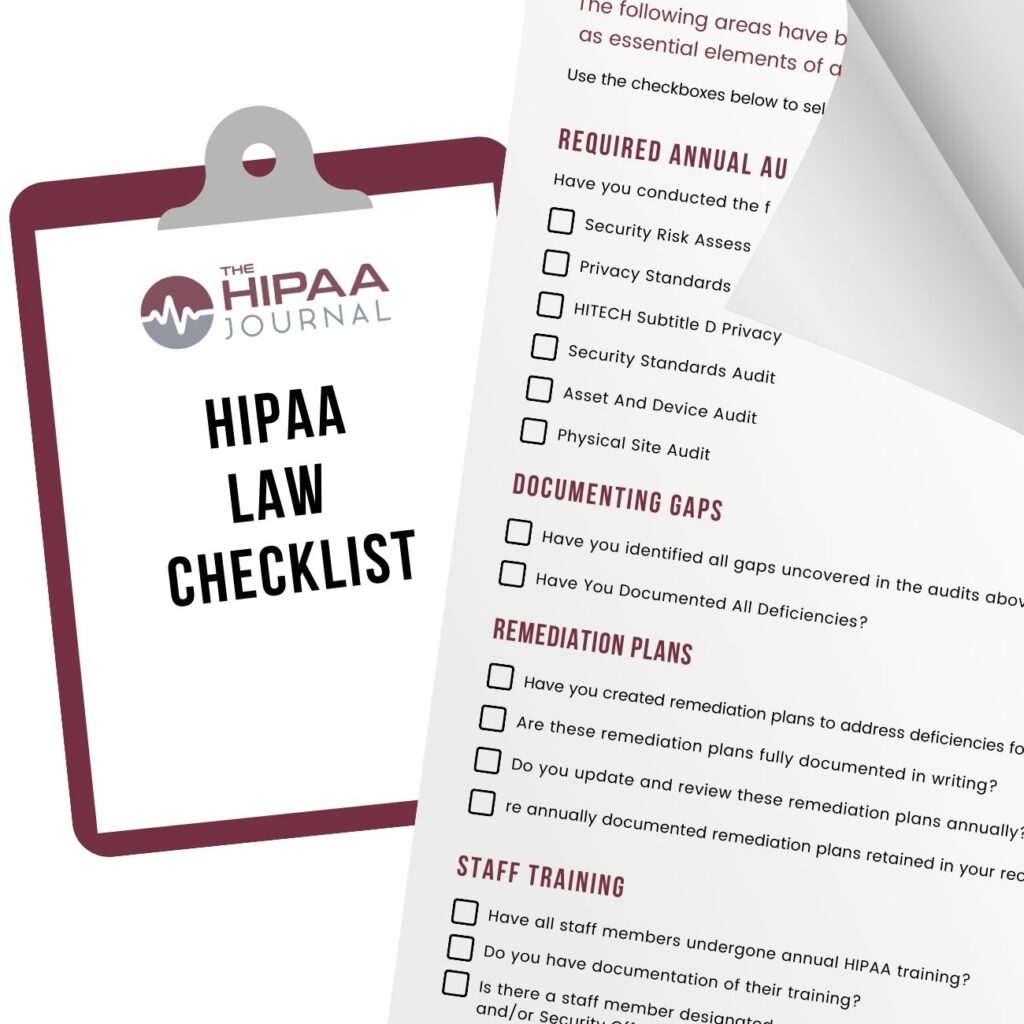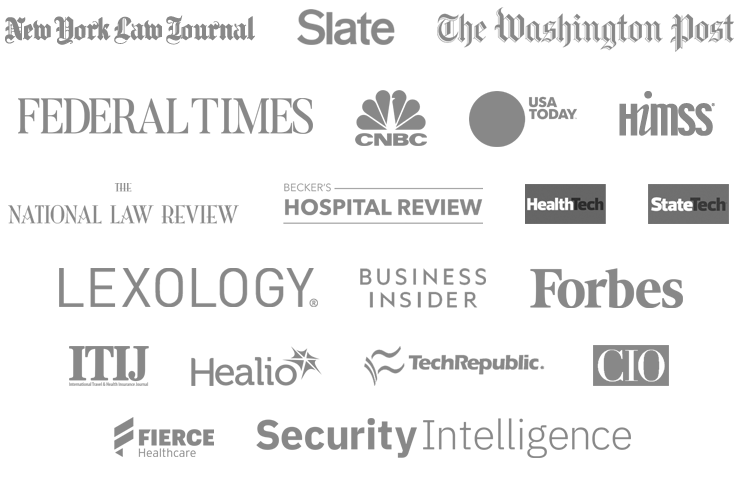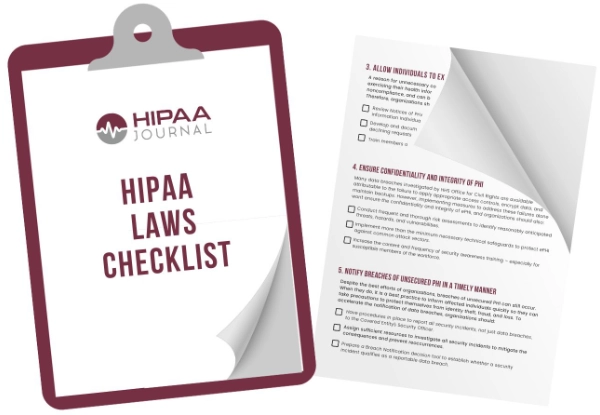What Are HIPAA Laws?
The main objective of HIPAA law is to protect the privacy of an individuals’ health information while at the same time permitting needed information to be disclosed for patient care and other purposes such as billing. This balance helps protect the rights of patients while ensuring smooth operation of the healthcare system.
 HIPAA compliance laws set the standards for protecting sensitive patient data that healthcare providers, insurance companies, and other covered entities must adhere to. You can use our HIPAA Law Compliance Checklist to check your compliance requirements and avoid HIPAA violations.
HIPAA compliance laws set the standards for protecting sensitive patient data that healthcare providers, insurance companies, and other covered entities must adhere to. You can use our HIPAA Law Compliance Checklist to check your compliance requirements and avoid HIPAA violations.
What follows is an overview of the main components of HIPAA Law:
The HIPAA Law Privacy Rule
A key component of HIPAA compliance law is the Privacy Rule, which sets out national standards for when protected health information (PHI) may be used and disclosed.

Get The FREE
HIPAA Compliance Checklist
Immediate Delivery of Checklist Link To Your Email Address
Please Enter Correct Email Address
Your Privacy Respected
HIPAA Journal Privacy Policy
PHI refers to any information about health status, provision of health care, or payment for health care that can be linked to a specific individual. This interpretation of PHI is broad and encompasses any part of a patient’s medical record or payment history.
Under the Privacy Rule, healthcare providers must implement necessary safeguards to protect the privacy of PHI. These safeguards are both physical (like locking filing cabinets) and technical (like password-protected electronic health records). Patients also have the right under the Privacy Rule to access, inspect, and obtain a copy of their PHI.
The HIPAA Law Security Rule
Another component of HIPAA compliance is the Security Rule. This rule applies specifically to electronic protected health information (ePHI), and covers the three types of security safeguards required: administrative, physical, and technical. These safeguards help to ensure that electronic patient data is secure from unauthorized access, loss, or damage.
Administrative safeguards focus on creating policies and procedures designed to clearly show how a Covered Entity must comply with HIPAA. Physical safeguards involve securing the physical facilities and equipment where data is stored and accessed. Technical safeguards refer to the technology and policy and procedures for its use that protect ePHI and control access to it.

Get The FREE
HIPAA Compliance Checklist
Immediate Delivery of Checklist Link To Your Email Address
Please enter correct email address
Your Privacy Respected
HIPAA Journal Privacy Policy
HIPAA Privacy Officers
Under the HIPAA compliance laws, organizations are obligated to designate a privacy officer responsible for implementing and maintaining the policies. PHI access should be strictly limited on a “need-to-know” basis, thereby ensuring that only those who need this information to perform their job responsibilities can access it.
Who Is Subject To HIPAA?
The standards for electronic transactions which qualify an organization as a HIPAA-Covered Entity appears in CFR 45 Part 2. Generally, an organization is a HIPAA Covered Entity when it is:
- A healthcare provider that conducts electronic transactions.
- A health plan
- A healthcare clearinghouse
Exceptions to this definition occur where an organization that does not qualify as a Covered Entity are somewhat involved in covered transactions. For example, if they act as an intermediary between an employee, a healthcare provider, and a health plan.
Additionally, an organization that self-administers a health plan but has less than fifty participants is not considered to be a Covered Entity.
HIPAA Law For Business Associates
A vital aspect of compliance is the execution of Business Associate Agreements (BAAs) with any third-party vendors accessing PHI. These agreements set the standard for PHI use and disclosure by business associates, placing limits and conditions on their actions involving PHI.
Does HIPAA Apply To Employment Records?
One potentially confusing area of the Administrative Simplification Regulations relates to employment records, HIPAA law, and employers. This is because the definition of individually identifiable health information in §160.103 includes “information collected from an individual or created or received by a health care provider, health plan, employer, or health care clearinghouse.”
However, the definition of Protected Health Information (also in §160.103) excludes “employment records held by a Covered Entity in its role as an employer.” This exclusion applies to individually identifiable health information an employer might receive and maintain in an employment record to explain – for example – the reason for a leave of absence due to sickness or an injury.

Get The FREE
HIPAA Compliance Checklist
Immediate Delivery of Checklist Link To Your Email Address
Please enter correct email address
Your Privacy Respected
HIPAA Journal Privacy Policy
HIPAA Law Enforcement and Penalties
Enforcement of HIPAA regulations is managed by the Office for Civil Rights (OCR) within the Department of Health and Human Services (HHS). If an entity is found to be non-compliant with HIPAA, they can face hefty fines and penalties. Fines are tiered based on the entity’s knowledge and handling of the breach.
The HIPAA Safe Harbor Law, introduced in January 2021, takes into account existing security practices when determining HIPAA violation penalties. For instance, if an entity didn’t know and, by exercising reasonable diligence, wouldn’t have known of a violation, the penalty may be less severe. However, if a violation is due to willful neglect and not corrected, the penalty can be very significant.
Summary: HIPAA Compliance Laws
HIPAA compliance laws are an essential aspect of healthcare, ensuring the protection and secure handling of sensitive patient health information. By establishing a framework of compliance through its Privacy and Security Rules, HIPAA has become a linchpin of patient rights and privacy within the healthcare sector.
As healthcare professionals, understanding and adhering to HIPAA regulations is not just a legal obligation but also a commitment to maintaining the trust and confidence of the patients they serve. The adherence to HIPAA compliance laws forms a crucial part of any covered entity’s operational framework.

Get The FREE
HIPAA Compliance Checklist
Immediate Delivery of Checklist Link To Your Email Address
Please enter correct email address
Your Privacy Respected
HIPAA Journal Privacy Policy

Get The FREE
HIPAA Law Checklist
Immediate Delivery of Checklist Link To Your Email Address
Please enter correct email address
Your Privacy Respected
HIPAA Journal Privacy Policy
HIPAA Journal featured on







